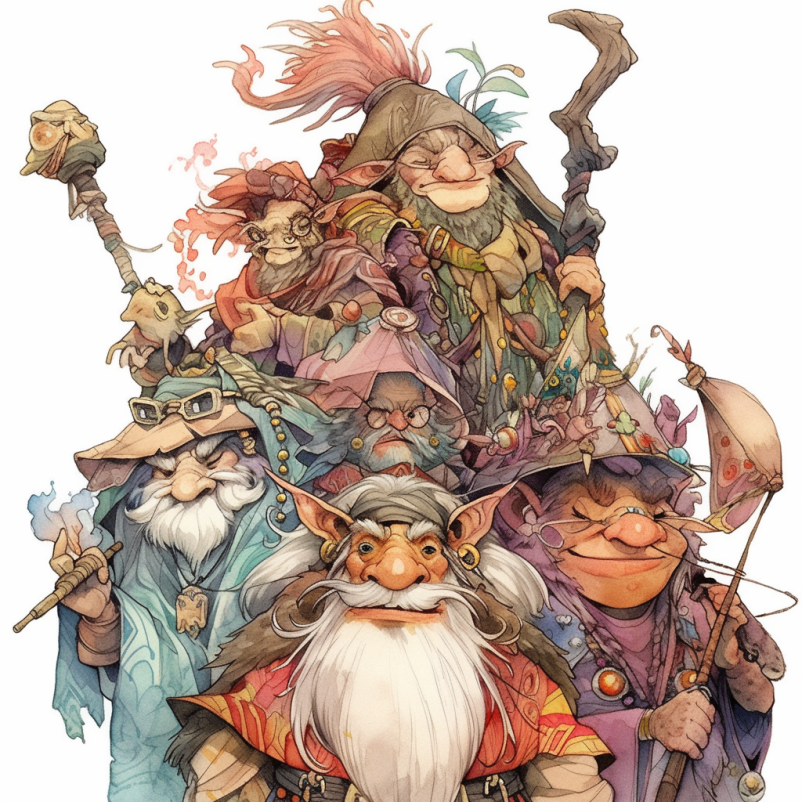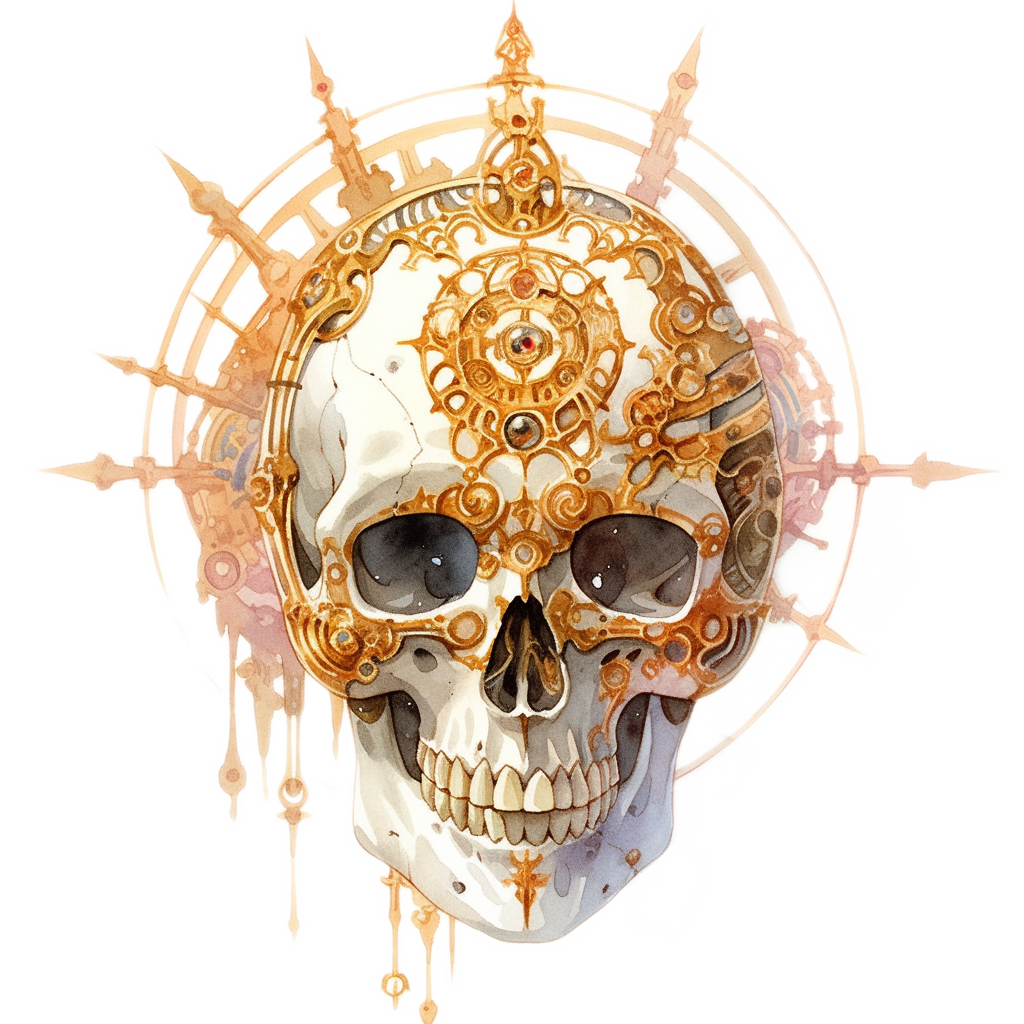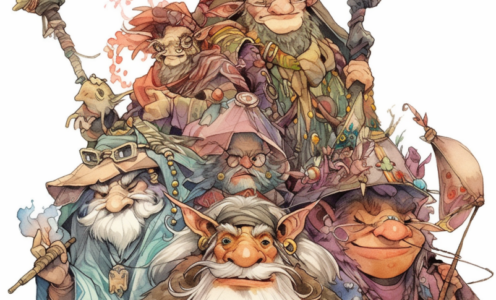The Shichifukujin
LG demipowers of happiness [various pronouns]
Pantheon: Japanese
Realm: Mount Celestia / Lunia / The Eight Happinesses
The Shichifukujin, also known as the Seven Lucky Gods or the Eight Immortals of Good Fortune, are a loose band of deities from Japanese mythology. Are there seven or eight of them? Who knows, cutter, the number changes each time you count them!
Each of these bloods embodies a different type of good luck, prosperity and happiness. Together they share a realm called the Eight Happinesses. They also love to travel together, as one large group on a magical treasure ship or in pairs, usually walking across the Upper Planes to spread good cheer and teach bashers lessons.
Benzaiten [She/Her] is a demipower of music, literature, art, and knowledge. She’s often associated with water and is depicted playing a biwa lute or reading. You’re most likely to find her sitting on a pontoon dipping her feet in the water and entertaining children with stories or music. She has eight arms, two of which are always folded in prayer, and is often seen in the company of her riding dragon.
Hotei [He/Him] is known as the Laughing Buddha, and is a demipower of contentment, generosity, and happiness. He’s often seen carrying a large sack of food that he will happily share with travellers, the poor or needs. He’s known for his big belly, baggy clothing and joyful demeanour.
Ebisu [He/Him] is the demipower of fishermen, luck in business, and honest work. He’s usually seen holding a fish and a fishing rod, symbolizing abundance from the sea. When he’s not fishing in the Silver Sea, he can often be found wandering in Bytopia, on adventures in Shurrock or teaching unsuspecting petitioners in Dothion how to fish, farm rice or mend nets.
He often greets folks in the form of a simple fisherman who has had an unusually good catch from the pier, which he’s happy to share. He’s also known to rescue those foolish enough to drown in the Silver Sea.
Ebisu is believed to bring luck and fortune to those who honour him, particularly in matters related to business, trade, and fishing. His joyful and approachable demeanour makes him a beloved figure in Lunia, and his presence is often invoked during celebrations and festivals.
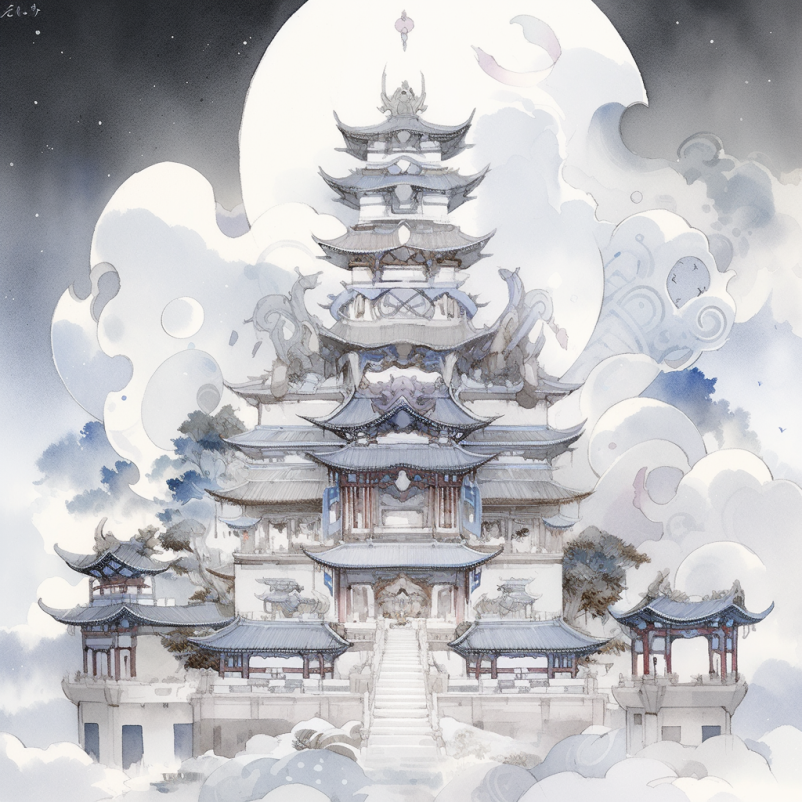
Daikokuten [He/Him] is a power of wealth, commerce, and prosperity. He’s a portly, balding cutter with an easy grace about him. He’s usually seen carrying a large sack of treasures and a magical mallet that brings fortune (and can shrink those he hits with it). He often accompanies Ebisu on his travels to Dothion, where he loves to masquerade as a simple merchant and interact with planewalkers.
Fukurokuju [He/Him] is the demipower of longevity, wisdom, and happiness. He appears as an elderly cutter with a long white beard, a long narrow head and a curiously short body. He’s often accompanied by a deer and a tortoise.
Jurōjin [He/Him] is a demipower of happiness and good health, especially in old age. He’s an old man with a staff and a scroll containing the wisdom of the ages. He can often be found with Fukurokuju, discussing philosophy, telling tall tales of their youth or drinking sake.
Kichijoten [She/Her] is the demipower of beauty, fertility, and abundance. She is as a graceful and elegant goddess, symbolizing both outer and inner beauty, as well as the virtues of compassion and kindness. Of all the Shichifukujin, Kichijoten is the most well-travelled; she’s been linked romantically with Vishnu of the Vedic pantheon and some say she and the Lakshmi are either siblings or two aspects of the same power.
There are many tales about the adventures of the Shichifukujin. Here are a couple to illustrate their wholesome doings:
Hotei and Fukurokuju’s Journey
Once upon a time, Hotei, the Laughing Buddha, and Fukurokuju, the god of longevity and wisdom, decided to go on a journey together. They wanted to spread joy and blessings to the people they met along the way.
As they walked through villages and towns of Lunia, Hotei entertained people with his infectious laughter and warm smile. He told stories, shared jokes, and made everyone he met burst into laughter. His presence brought a sense of joy and light-heartedness wherever he went.
Fukurokuju, on the other hand, spent his time sharing his wisdom and knowledge. He would engage in conversations with people, answering their questions and offering guidance. He encouraged people to seek knowledge, learn from each other, and value the wisdom that comes with age.
As they traveled, Hotei and Fukurokuju found that their unique qualities worked in harmony. Hotei’s laughter opened hearts and minds, making people more receptive to Fukurokuju’s teachings. And Fukurokuju’s wisdom gave depth and meaning to the happiness that Hotei brought.
One day, they came across a village suffering from a drought. The people were sad and worried about their crops. Hotei’s laughter lifted their spirits, and they began to see the silver lining even in their difficult situation. Fukurokuju shared his wisdom about conserving water and adapting to changing circumstances. Together, they helped the village find hope and solutions.
As they continued their journey, people would often say that wherever Hotei and Fukurokuju travelled, prosperity and happiness followed. The duo became a symbol of balance and harmony, showing that joy and wisdom are two sides of the same coin, and inspiring people to find happiness in the simple joys of life while valuing the wisdom that comes from experience.
Ebisu and Daikokuten’s Fishing Contest
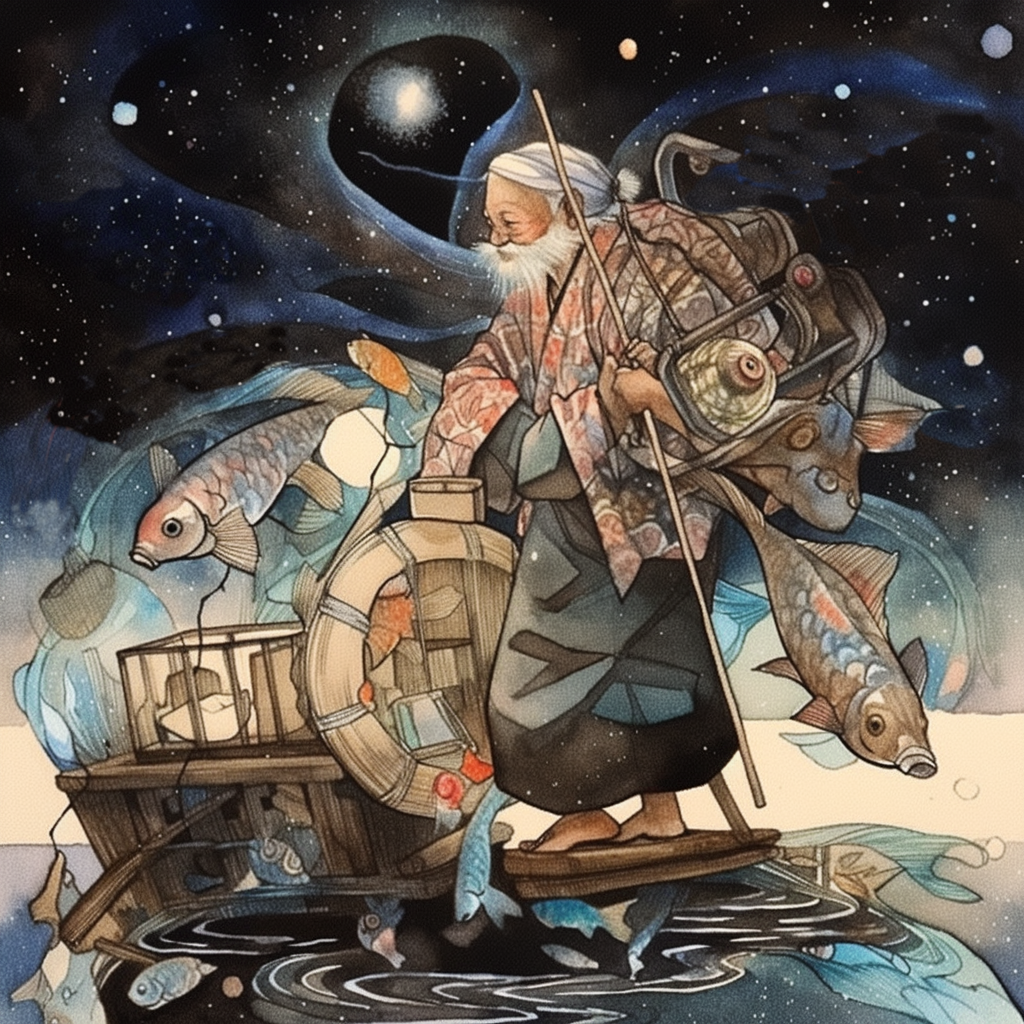
One day, Ebisu, the god of fishermen and honest work, and Daikokuten, the god of wealth and prosperity, decided to have a friendly fishing contest. They both loved the Silver Sea and wanted to see who could catch the most fish.
Ebisu went out on his small fishing boat and cast his line into the water. He waited patiently, his heart filled with gratitude for the bounties of the sea. Before long, his line began to tug, and he pulled in fish after fish. Each fish seemed to jump onto his line willingly, as if offering themselves to him.
On the other hand, Daikokuten set up his fishing spot on the shore. He used his magical mallet to strike the ground, creating a small pond. Then, he threw in his fishing line, and instantly, the pond filled with an incredible number of fish. It seemed as though the fish were drawn to him by his aura of prosperity.
As the contest continued, both gods caught a tremendous number of fish. However, Ebisu’s fish were larger and more impressive, each one a testament to his respect for the sea and the honest work of fishermen. Daikokuten’s fish, while numerous, were smaller and lacked the same grace.
In the end however, the powers declared the contest a tie, each recognizing the unique strengths of the other. From that day on, fishermen and those seeking prosperity have prayed to both Ebisu and Daikokuten for blessings and good fortune, knowing that their combined efforts bring harmony and abundance to the world, and their individual strengths complement each other to create a balance of good fortune and honest living.
Canonical References:
- On Hallowed Ground (2e) p159, 179
- Planes of Law: Mount Celestia (2e) p9
- Planes of Law: Player’s Guide (2e) p30
Source: mimir.net
